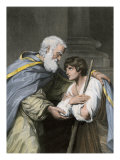Every kind of honor and happiness was bestowed upon you, and then was fulfilled that which is written, ‘My beloved did eat and drink, and was enlarged and became fat, and kicked.’ Hence flowed emulation and envy, strife and
sedition, persecution and disorder, war and captivity.
“So the worthless rose up against the honored, those of no reputation against such as were renowned, the foolish against the wise, the young against those advanced in years. For this reason righteousness and peace are now far departed from you, inasmuch as everyone abandons the fear of God, and is become blind in his faith, etc.” – The First Epistle of Clement to the Corinthians
Journal,
The purpose of this entry is to provide a bit of education on the issues that Paul had to deal with concerning the church at Corinth. It is well worth the reading.
Let’s begin with Clement. The afore quote is from a letter of Clement to the Church of Corinth. Scholars are in favor that this letter was written by the traveling companion of the apostle Paul. When Clement wrote this letter both Paul and Peter had been martyred not too many years prior.
Paul speaks of Clement and other workers who helped him;
[They] have shared my struggle in the cause of the gospel, together with Clement also and the rest of my fellow workers, whose names are in the book of life.” (Phil4:3) [Clement lived A.D. 30-100]
This letter by Clement was written either following the destruction of Jerusalem, or just prior. It was only one of several letters written by those who knew the apostles, that were read in the Churches. Clement along with Barnabas, and a couple more writings, were given consideration with regard to being placed in the New Testament canon of Scriptures. The church historian Eusebius held Clement in high esteem. (Clement is in the 1st volume of ANF and is found in the Alexandrian manuscripts.)
What were the problems at Corinth?
There were so many that it would take too much effort to try to address them all. However, there was one very serious situation that called for special concern by the apostle Paul. It had to do with the gifts of the Spirit and in particular the gift of speaking in foreign or other languages.
 There is much more to this story. The City of Corinth was less than 50 miles across the Corinthian Gulf from Delphi. To the Greeks, Delphi was considered the center of the earth. There was a stone set in place that was called the navel of the earth. Delphi had the Delphic oracle, which belonged to the Earth goddess, and was supposedly guarded by a serpent, Python. (Keep the serpent Python image in view.)
There is much more to this story. The City of Corinth was less than 50 miles across the Corinthian Gulf from Delphi. To the Greeks, Delphi was considered the center of the earth. There was a stone set in place that was called the navel of the earth. Delphi had the Delphic oracle, which belonged to the Earth goddess, and was supposedly guarded by a serpent, Python. (Keep the serpent Python image in view.)
At the Delphi temple they practiced a pagan glossolalia or speaking in tongues, but not in any language that could be understood. This influence of the pagan glossolalia was strongly felt not only in Corinth, but also in the entire Grecian world. (You can study this in most encyclopedias.)
The way the oracle worked was that a male prophet at the temple would receive a question from an inquirer. The question could be personal, or about government affairs, or whatever. The inquirer would be brought into the presence of a young woman priestess of Apollo who was said to have a “pythonic spirit.” The young woman would speak in unintelligible utterances, often fall out in a frenzy, supposedly through the spirit of Apollo in her, and the prophet would interpret the message.
It seems that Paul encountered this pythonic spirit at work in Philippi.
It happened that as we were going to the place of prayer, a slave-girl having a spirit of divination [puthõna] met us, who was bringing her masters much profit by fortune-telling.” (Act 16:16 NASB)
The issue of gifting
It is important to understand that Paul never took away from their being a gifting from God concerning speaking in other languages. The problem seems to be that certain ones who had been to the Delphic priest were beginning to show up in the congregation, and very likely, even some of the priests and priestesses were entering.
The Christians would have been considered a threat to the Delphic oracle. In addition the Corinthian believers may have felt like they were in competition with the Delphic oracles. This was probably why Paul had to deal so much with the issue of speaking in tongues with the Corinthian church. You don’t find it in any of the other churches.
If you read the Corinthian letters with this background in mind, it will help you appreciate some of the things Paul is addressing. Listen carefully to the language:
Now concerning spiritual gifts, brethren, I do not want you to be unaware. You know that when you were pagans, you were led astray to the mute idols, however you were led.” (1Co12:1,2.)
From this we can assume that some of the Corinthian believers had taken part in the Delphic oracles. It was the spirit of divination that had led them astray. (Keep in view the term, ‘led
astray’. We are going to see it again in Paul’s second letter to the Corinthians. )
Again:
Therefore I make known to you that no one speaking by the Spirit of God says, ‘Jesus is accursed’; and no one can say, ‘Jesus is Lord,’ except by the Holy Spirit.” (1Co12:3)
Someone was speaking by a spiritual power that declared Jesus was accursed. Paul’s contention was that the Holy Spirit would most certainly not say that Jesus is accursed. There is a vast difference between Jesus being accursed and Jesus taking the curse of the Law upon Himself at the cross. But these false outbursts of prophecies were leading the people astray.
Can a person confess the wrong Jesus?
For someone to truly make the confession that Jesus is Lord, would be an act of the Holy Spirit.

Anwk cross - Egyptian godsHowever, can someone say that Jesus is Lord and it not be of the Holy Spirit? Yes, if there is a occultic spirit involved. Paul addresses this issue in his second letter. He says it is possible to preach a Jesus who is not the Jesus of the Bible. (See the book 'The Beautiful Side of Evil by Michaelson.)
Listen to Paul:
But I am afraid that, as the serpent deceived Eve by his craftiness, your minds will be led astray from the simplicity and purity of devotion to Christ.” (2Co11:3)
Remember the term ‘led astray.’ There it is again. Paul used it in both letters. In this second letter, Paul is coming even more strongly against the people being led astray.
Notice the background of being led astray is still the ‘serpent.’ The inference may possibly be to the pythonic spirit again. ‘Led astray’ is the Greek word phtheiro, which means to corrupt or spoil. The corrupting is a spiritual deception.
This word is used in Rev19:2, where it says,
He has judged the great harlot who was corrupting (phtheiro) the earth with her immorality, and He has avenged the blood of His bondservants on her.”
Paul shows how this corrupting influence works. He said,
For if one comes and preaches another Jesus who we have not preached, or you receive a different spirit which you have not received, or a different gospel which you have not accepted you bear this beautifully” (2Co11:4)
The Corinthian group was coming under the influence of the occult. There is no other way to explain an involvement with a different Jesus, a different spirit, and a different gospel. You may think this is hard to do, but Church history has proven that this has always been a real danger for believers.
Clement has more to say.
Let’s come back to Clement’s letter which was written after the passing of Paul and Peter. I want to share a few notable quotes from his letter. It gives an idea of what happened to the church in Corinth, and what can happen in a church today if a spirit of occultism enters the scene.
Your schism has subverted the faith of many, has discouraged many, has given rise to doubt in many, and has caused grief to us all. And still your sedition continues.”
“The height to which love exalts is unspeakable. Love unites us to God. Love covers a multitude of sins. Love beareth all things, is long-suffering in all things. … Love admits no schisms.”
“All the generations from Adam even unto this day have passed away; but those who, through the grace of God, have been made perfect in love, now possess a place among the godly.”
“Through envy and jealousy, the greatest and most righteous pillars of the Church have been persecuted and put to death. … Peter, through unrighteous envy … Paul also obtained the reward of patient endurance, after being seven times thrown into captivity … Thus was he removed from the world and went into the holy place…”
Did the Church at Corinth ever revert itself? Who knows. We do have a promise that the Lord will not lose any that belong to Him. It is possible that the Lord simply removed His people to a place of His choosing. But this is speculation
Historically speaking…
Historically there is no evidence that ‘glossais lalein’ [speaking in another language] played a continuing role in the advance of early Christianity. There have been resurgences in this area but they almost always proved to be of the occult. Paul gives the only Scriptural explanation that we can find as to why. Some find this a difficult Scripture, but it needs to be considered.
Paul said,
Love never fails; but if there are gifts of prophecy, they will be done away; if there are tongues, they will cease; if there is knowledge, it will be done away. For we know in part and we prophesy in part; but when the perfect comes, the partial will be done away with.” (1Co13:8-10)
Paul doesn’t say when these things will happen. Some think he is speaking of heaven. Others think he is speaking of the apostolic era. But there is a word that Paul uses that may be the key. It doesn’t speak of heaven or of the apostolic era perse.
 Listen carefully. Paul said,
Listen carefully. Paul said,
But when the perfect comes, the partial will be done away.” (v10)
If we stopped there, it could easily mean heaven. But Paul continues;
When I was a child, I use to speak like a child, think like a child, reason like a child; when I became a man, I did away with childish things.” (Vs11)
Paul is using a word here that he only uses one way. It has regard to maturity. He said,
But when the perfect (teleois) comes, the partial will be done away.”
I can’t emphasis enough the usage of this word. It is never used with regard to heaven. It means when something reaches its desired goal, or a state of maturity. What did Paul mean by perfect? It is possible that he had the transition of covenants in view.
The new covenant taking its place
Listen to this statement in Hebrews 8:13;
When He said, ‘a new covenant,’ He has made the first obsolete. But whatever is becoming obsolete and growing old is ready to disappear.”
The old covenant had not disappeared as long as the temple was visible. As long as the temple sacrifices were in place the former covenant was still visible for all to see. This was a special time in the changing of covenants. Many of the people were still thinking on an old covenant level. They did not have the spiritual maturity that would replace entirely the old.
The temple sacrifices offered no atonement for sin. Yet a great many of the priests had received Jesus as Lord, and still involved in temple sacrifices. (Cf. Acts 6:7)
The book of Hebrews was written not long before the destruction of Jerusalem. It was like a final warning to the Jewish people.
The prophets testimony
This brings us back to the prophet’s testimony concerning the purpose of ‘glossais lalein’, that is, speaking in other languages. God speaking in Isaiah 28:11,12, said,
Indeed He will speak to this (Jewish) people through stammering lips and a foreign tongue … but they would not listen.”
Follow through with Isaiah 28:13;
… they may go and stumble backward, be broken, snared and taken captive.”
This is exactly what happened in 70 a.d. The temple was destroyed, Jerusalem burned to the ground, and the people were taken captivity into the nations. In addition, there was no longer any visible evidence of the former covenant in place. The transition was over.
What had happened? The superior covenant was fully in place. This is likely what Paul had in mind, when he said that prophecy would be done away with and tongues would cease. These things would be replaced by something superior, that is, a mature spiritual walk with the Lord, where each child of God is able to hear from the Lord for himself.
And this is where believers today need to learn to live their life on a new covenant level. When Paul speaks of prophecy, it is likely he was speaking of a prophet sharing from the voice of God. Yet in the new covenant experience, that is not God’s best. One of the defining marks of the new covenant is that every person hears God personally. Jesus said,
My sheep know My voice, and another they will not follow.”
Notice how the book of Hebrews begins;
God, after He spoke long ago to the fathers in the prophets in many portions and in many ways, in these last days has spoken to us in His Son, whom He appointed heir of all things, through whom also He made the world.” (1:1,2)
God now speaks to His people through the voice of His Son. The Old Testament prophetic ministry had come to a close. We see this on the Mount of Transfiguration. When Moses and Elijah disappeared we hear a voice from heaven,
ministry had come to a close. We see this on the Mount of Transfiguration. When Moses and Elijah disappeared we hear a voice from heaven,
This is My beloved Son, with whom I am well pleased; LISTEN TO HIM.” (Caps for emphasis only.)
Did not Jesus say that the law and the prophets were until John?
In the new covenant every true believer has the attending voice of Jesus speaking into his or her life. This is one of the validating factors that we have entered the kingdom of the beloved Son.
In the former covenant, you had to seek out a prophet. Not so in the covenant of Christ. God spoke through the prophet, and said,
For all will know Me, from the least to the greatest of them. For I will be merciful to their iniquities, and I will remember their sins no more.”
Time for a check up
And here is where we need to use caution. Paul did not say that these elements of prophecy and speaking in other languages would be ‘destroyed.’ What he said was that they would be rendered useless, or, ‘idled.’ Paul was simply telling the Corinthians, not to get over-focused on these particular gifts. There is no question that the Lord can speak to us through others. But to go about seeking a prophet today can do much damage to a believer’s walk with the Lord.
I realize everyone has their own thoughts, opinions, and experiences. But in the study of Scriptures, it is important not to let our experiences determine what we believe. We must learn to be true to the Scriptures.
Everything I have shared in this entry is for educational purposes. My advice to believers today is to remain on guard against any form of occultism. Familiar (pythonic) spirits love to enter into congregations and play off as being from the Lord.
Here is your song for today. Please listen to it. It is titled, ‘In Christ Alone.’
May the Lord’s blessings rest upon you and all that is yours,
In Christ always,
Buddy
Views: 49




 A word on healing
A word on healing That’s when I said no more tests. I felt that it was a spiritual attack and not simply something physical. (There is so much more to the story. This is a shortened version.)
That’s when I said no more tests. I felt that it was a spiritual attack and not simply something physical. (There is so much more to the story. This is a shortened version.)


 Remember what the Lord said in
Remember what the Lord said in 


 Christians studied. What did they study, you say? They studied Moses and the prophets, the memoirs of the apostles and the directives to the Churches.
Christians studied. What did they study, you say? They studied Moses and the prophets, the memoirs of the apostles and the directives to the Churches. J
J

 One of my dear pastor friends shared the following with me. It was written by a 8 year-old from Chula Vista, California, as a third grade homework assignment, to explain God.’ (Thanks Art)
One of my dear pastor friends shared the following with me. It was written by a 8 year-old from Chula Vista, California, as a third grade homework assignment, to explain God.’ (Thanks Art) so he told him he didn’t have to go out on the road anymore. He could stay in heaven. So he did. And now he helps his dad out by listening to prayers and seeing things which are important for God to take care of and which ones he can take care of himself without having to bother God. Like a secretary, only more important.’
so he told him he didn’t have to go out on the road anymore. He could stay in heaven. So he did. And now he helps his dad out by listening to prayers and seeing things which are important for God to take care of and which ones he can take care of himself without having to bother God. Like a secretary, only more important.’
 Expect the Unexpected
Expect the Unexpected
 The love of God is a Divine outflow of His own heart. It flows from God to His children. God then wants His love to flow out from His children to those who are without Christ, and also to other struggling believers. So He gives us testimonies of His grace and of His love.
The love of God is a Divine outflow of His own heart. It flows from God to His children. God then wants His love to flow out from His children to those who are without Christ, and also to other struggling believers. So He gives us testimonies of His grace and of His love.